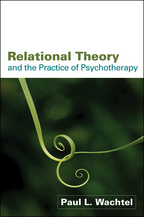Relational Theory and the Practice of Psychotherapy
Paul L. Wachtel
2. How Do We Understand Another Person? One-Person and Two-Person Perspectives
3. The Dynamics of Personality: One-Person and Two-Person Views
4. From Two-Person to Contextual: Beyond Infancy and the Consulting Room
5. Drives, Relationships, and the Foundations of the Relational Point of View
6. The Limits of the Archaeological Vision: Relational Theory and the Cyclical–Contextual Model
7. Self-States, Dissociation, and the Schemas of Subjectivity and Intersubjectivity
8. Exploration, Support, Self-Acceptance, and the “School of Suspicion”
9. Insight, Direct Experience, and the Implications of a New Understanding of Anxiety
10. Enactments, New Relational Experience, and Implicit Relational Knowing
11. Confusions about Self-Disclosure: Real Issues, Pseudo-Issues, and the Inevitability of Trade-Offs
12. The “Inner” World, the “Outer” World, and the Lived-In World: Mobilizing for Change in the Patient’s Daily Life



